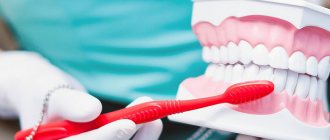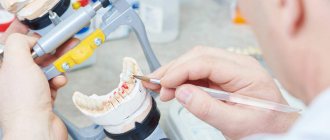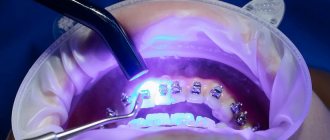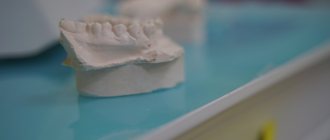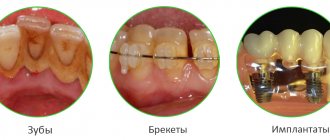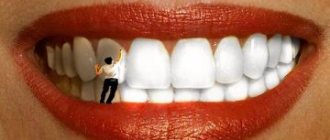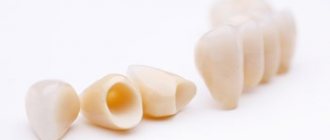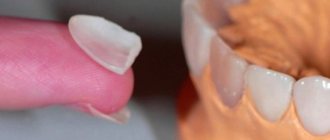What profession could a modern person not imagine his life without? Every day we meet hundreds of representatives of different fields, but day X comes, and then we start thinking about those specialists whom many are afraid of. We are, of course, talking about dentists. Many are afraid of these doctors and endure toothache to the last, so today we decided to tell you more about the dental profession and prove that these are wonderful and kind people who wish their patients only goodness and health. What specializations exist in dentistry, does this profession have pros and cons, and where should you go to study to become a dentist? The dentist-therapist answered all our questions Elena Bobkova.
Who is a dentist?
A dentist is first and foremost a doctor, a specialist in the field of problems of the oral cavity and maxillofacial area.
He checks the condition of teeth and treats patients, advises on issues of implantation, growth, changing teeth, and gives recommendations on further oral care.
Advantages of the specialty
Dentistry, as a profession, is suitable for caring people. In addition to the fact that the specialty is in demand and provides a stable income, the work of a doctor brings moral satisfaction.
When a dentist helps people relieve pain, solve bite problems, straighten crooked teeth, or insert missing teeth, the results bring relief and joy to patients. This gives the specialist additional motivation to expand his skills, improve his qualifications, and continue professional growth.
There is an opportunity to build a career. After receiving their diploma, most graduates enter residency. They become narrow specialists. Those who want to go beyond dentistry complete an oral surgery residency and then enroll and study for another five years to become a plastic surgeon.
Having received a basic higher education in dentistry, it is possible to continue postgraduate education in specialties in demand in the administrative field of healthcare. This path is suitable for those who have organizational skills, a desire to occupy leadership positions, and participate in improving the provision of medical services.
Those who want to engage in teaching work can try to stay in departments of the faculty to teach students. It is better to choose a department - an area of competence - during your student years: participate in scientific student circles, interuniversity Olympiads, decide on the choice of a scientific advisor, and begin preparing for graduate school.
The development of related sciences, improvement of technological capabilities, the emergence of new materials and equipment facilitates research work. Graduates who want to engage in science will also find employment.
Characteristics of the profession - what it does, functions and responsibilities
Let's see what specializations dentists have:
- The therapist is the doctor to whom you turn first. The general practitioner analyzes the general condition of the teeth. Finds problem areas, treats caries, removes nerves, puts fillings and restorations, and prepares teeth for prosthetics.
- The surgeon performs operations in the oral cavity: removes teeth, restores the jaw after injuries, prepares the oral cavity for implantation, prosthetics, orthodontic and orthopedic treatment. Deals with problems related to inflammatory processes, cysts and tumors.
- The orthodontist corrects malocclusion - a situation where the jaws do not close evenly, but with a deviation to the right or left, corrects the curvature of the teeth - increased crowding, in which the teeth have “not enough space” and they run into each other or vice versa. The result of his work carries an important aesthetic point for the patient.
- Orthopedist – comes to the rescue when teeth are missing. Restores them with the help of dentures, removable or permanent, and fully reproduces the important chewing function. If it was possible to save a small part of the tooth, then it uses restoration technology using a crown. This doctor works in tandem with a dental technician - a specialist in the manufacture of dentures and prosthetic elements for a specific case.
- Hygienist is a relatively new field. Monitors the cleanliness of the oral cavity, carries out preventive and hygienic procedures to maintain oral health. Removes plaque, tartar, polishes enamel. Provides consultations regarding the prevention of dental diseases.
- Implantologist – specializes in restoring lost teeth using implants. Innovative technology allows you to install tooth analogues that are no different from real ones. Conducts a full examination, preparation in several stages and the implantation itself. Observes the patient throughout the entire period of rehabilitation after the intervention.
- A pediatric dentist is a doctor who deals with children's dental problems. Removes and treats baby teeth so that the molars are formed healthy, puts fillings, fights diseases associated with the oral cavity, which children are prone to at an early age. A pediatric dentist should not be a doctor, but a kind wizard who will convince the child to treat his teeth and be able to perform all the manipulations without tears.
Pride of the profession
Every activity has its own stars. Dentistry is no exception. Next, let's look at the most famous female dentists.
Yegana Marufidi
Therapist, periodontist. Yegana works in the direction of aesthetic restoration. Work experience over 20 years. In reviews, clients note the attentiveness of the doctor. They emphasize accuracy in work and a personal approach to each client.
Nadezhda Zholobko
Pediatric dentist providing treatment and prosthetic services. In addition, she deals with cosmetic dental restoration and professional cleaning of the oral cavity.
The doctor notes that it is important to consult a specialist in a timely manner. In the early stages, caries in children can be treated painlessly. Otherwise, the child will face pain and discomfort.
Natela Lomakina
The doctor works in such specialties as therapy, surgical dentistry, restoration and aesthetics. Natela has experience in management activities.
Since the beginning of the 2000s he has been working in Milan. She underwent retraining in dental centers in Italy. Having mastered innovative European-style dental technologies, she became the creator and director of a famous dental center.
Irina Litvin
Maxillofacial surgeon. Despite little work experience, she has established herself as a professional in her path. The key specialization is aesthetic rehabilitation of patients. New works by Irina are constantly published regarding the relationship between the temporomandibular joint and the psychological state.
What a dentist should know and be able to do - personal qualities and skills
First of all, have a great desire to help people. There is no person who has never had a dental problem.
The doctor must find an approach to everyone, convey the need for the procedures performed and set them up for a positive outcome. Calm and support.
The profession is associated with the ability to work with a large amount of information at the initial stage; in the future, it is important to be able to successfully combine knowledge with practice. This is the basis for making a diagnosis - a decisive role in dental treatment.
A lot of daily work awaits the future specialist. The profession implies constant improvement and training, because modern dentistry does not stand still, new types of treatment appear every year.
This is important: a modern doctor must not only know about innovations, but also be able to apply them in practice.
Who should go to the dentists?
There is no shortage of personnel in this market segment. On the contrary, this is a very in-demand profession. About 2.5 thousand dentists graduate from higher educational institutions every year. In principle, this is relatively little, but this indicator is quite enough to satisfy the demand for dental services.
It is important
The character of the specialist should be calm. Particularly important are balance, diligence, and attentiveness. The dentist must be as careful as possible, because he works with a miniature instrument.
Sociability and ability to pay attention. A qualified specialist must be tactful, regardless of who turned to him for help.
Specialization requires high vision and developed fine motor skills.
What subjects need to be taken
To enter the Department of Dentistry, students must pass mandatory exams in the subjects of biology and chemistry. An additional subject from the university and one of the applicant’s choice are also taken.
It is advisable to have at least a basic knowledge of Latin, which is the basis in medical terms. After 9th grade, you can go to college, where the requirements for OGE scores are much lower.
Like any university, medical schools have paid training (for those who do not pass the test) and budget training (available to certain categories of people and high-impact students whose Unified State Exam scores are close to 300).
The answer to the question of how much tuition costs should be found on the website of a specific university.
Tamara, can you tell us how it happened, that you have dreamed of dentistry since childhood?
I was born and raised in Leningrad, studied at the Physics and Mathematics Lyceum, and was interested in drawing, clothing design, dancing, and music. As a child, I loved going to the dentist, who, unlike other doctors, made everything clear - he came in with caries and left with a filling. I always wanted to help people, so at the age of five I decided that I wanted to be a dentist. My parents found out about this only when I was in ninth grade, and they were shocked, because they dreamed of me becoming a lawyer or economist. But I knew for sure: I would die, but I would become a dentist.
The choice of university was obvious - I always tried to choose the best, so I decided to study at St. Petersburg State University. Only 25 people were recruited for the course, and I liked that there would be small groups of 5 people - which means the training will be of high quality. The competition was great, and it was not easy to enter, but when there is a goal, then any obstacle can be overcome.
Which universities offer training in this specialty?
According to statistics, medical education in Russia is of the highest quality, and this is the key to a healthy nation. There are no special dental universities in our country.
Almost every medical school is recruiting for the Faculty of Dentistry. Depending on the chosen educational institution, different forms of education will be offered: full-time, part-time, evening.
You can enroll after 11th grade. This specialty is also offered by medical technical schools and colleges, which can be entered after completing 9 grades.
As a rule, all educational institutions have budget places. To take them, you need to have a high score on the Unified State Examination, otherwise the cost of training will fluctuate up to 400 thousand for leading universities in Moscow and St. Petersburg and on average up to 250 thousand in the regions. Education in technical schools and colleges costs an order of magnitude lower.
Study, courses and demand
Every dentist has a long and thorny career path. It all starts in one of the most difficult educational institutions - medical school. A diploma issued at the end of school does not guarantee admission to a government-funded place. Therefore, most modern specialists graduate from paid departments of medical universities. On average in Russia, studying at a medical university costs about 300 thousand per year, and this is not the highest price. The training lasts for five years, then specialists undergo residency for two years to gain experience and develop in a certain specialization. Only after this can the doctor begin to work fully.
And it would seem that the training is over. But not in medicine, since with the development of modern technologies and the improvement of materials, approaches to dental treatment also change. Therefore, a dentist must annually attend various seminars, courses and lectures to improve his knowledge and exchange valuable experience with colleagues.
Now let's talk about salary. The payment a dentist receives depends on several factors: the doctor’s experience, his place of work, and the complexity of the treatment performed. It's no secret that dentists in private clinics earn much more than their colleagues from public dentistry. However, getting into a well-known clinic with a large flow of patients is not at all easy due to high competition. In Russia, on average, a dentist earns about 70 thousand rubles, but doctors always have a chance to earn more.
Don't forget about advanced training. According to Russian legislation, dentists must improve their qualifications every five years. This can be done by attending medical conferences and courses, which we talked about earlier.
Photo from the personal archive of Elena Bobkova /
Where can a dentist work?
Commercial dentistry is now leading the way in providing jobs. The state is pursuing a policy that supports medical workers, providing decent wages, high pensions and the opportunity to purchase subsidized housing.
This profession will always be popular and relevant, because every person has been a patient of a dentist for almost his entire life.
Tell us about the clinic you opened. Is it difficult for a doctor to run a business?
I worked in different places, and as a result I developed the image of an ideal clinic for a doctor and for patients. The most important thing for me is the patient’s comfort, quality treatment, and the use of only modern materials and treatment methods. Highly qualified doctors and honest dentistry, where unnecessary services are not imposed on patients. I believe that you either need to treat well or not at all. Of course, combining the professions of a doctor and a businessman is difficult. But I have a priority, my main focus is on quality. This is probably the reason for my success.
How much do dentists earn?
The average salary in public dentistry is 25 - 50 thousand rubles per month , bonuses and subsidies are paid, depending on the length of service and qualifications of the doctor.
Commercial clients provide the opportunity to earn from 40 to 150 thousand rubles. These figures vary depending on the region.
History of dentistry
Dentists learned to treat teeth without pain and discomfort quite recently, although the first dental aesculapians were practiced in ancient times. Treatment methods were non-contact. Priests and shamans of various profiles relieved toothache with the help of spells, and if that didn’t work, they removed the tooth, it’s scary to imagine what methods.
It can be assumed that due to the quality of products, ecology and methods of cooking, our ancestors had different teeth. But the main methods of treating them, oddly enough, are basically the same as now. Archaeological finds show us drilled and sealed jaws.
Dentists in Ancient China had their own methods of treating maxillofacial diseases. They included traditional medicine recipes and magical spells. Baths or hairdressers served as medical rooms for tooth extraction.
The Egyptians were real professionals in dentistry. The profession of dentistry in Ancient Egypt was considered very popular, and people who knew it were highly respected. Still would! Getting rid of toothache was comparable only to God's grace.
The Egyptians came up with a variety of filling materials based on medicinal plants and fastening materials. Special compositions made by Egyptian dentists made it possible to successfully treat inflammation of the internal tissues of the tooth, gums and other dental diseases.
There is historical evidence that in Ancient Egypt, dentists performed prosthetic operations on lost or extracted teeth. The new tooth was tied to the adjacent teeth using gold wire.
The Egyptians are also considered the inventors of toothpaste. It was made on the basis of pumice with the addition of eggshells, ash, various plants and even wine.
In Ancient Mesopotamia, diseased teeth were treated comprehensively. First, a specially prepared paste of “poisonous” henbane and other components of plant origin was placed into the tooth cavity. Then a spell was added to the treatment. The text of the conspiracy against toothache has survived to this day. This is not just a collection of words, but a serious poetic work.
By the way, henbane and the smoke from burning it in dentistry were used as anesthesia. There is information about other methods of pain relief. Ancient doctors “calmed” an inflamed dental nerve by cauterizing it with a hot iron.
Removal of the dental nerve using arsenic first occurred only in 1836, although this drug was known to doctors in the Middle East at the end of the 1st millennium. Novocaine and lidocaine were first used for painless treatment and tooth extraction in 1905.
The prototype of the drill was a drill, which provided access to the inflamed tissues of the tooth. It was invented by the Roman physician Archigen. The first machine for drilling tooth enamel was invented at the end of the 18th century by the personal dentist of US President George Washington, John Greenwood. The device worked on the principle of a spinning wheel and was driven by a foot drive.
The colossal evolution in the development of the dentist's main tool was associated with an increase in the number of revolutions that the drill drill makes. Today this number is about three million, but at one time it was less than two thousand.
Do you know who a fumelier is? What about the torsedor? You will find the answer to this question in our article - TOP 30 rarest professions in Russia and the world.
The material for making dentures used to be the teeth of the poor and the dead. After the wars, their number increased sharply. The period of development of prosthetics occurred in the Middle Ages. As now, the procedure was expensive, only wealthy people could afford it. Dentures were made from precious metals, ivory and other materials, but they were considered inconvenient and served more of a cosmetic function.
In Russia, the profession of “dentist” was officially recognized by Peter the Great, who himself tried dental treatment abroad. By the way, the first dentists in Russia were also foreigners. But in 1881, the first educational institution for training dentists opened in St. Petersburg. Following him, dentists began to be trained throughout the country.
Career growth of a dentist
Dentists are divided into categories: first, second and highest. To confirm the first category, you need experience (three years), protection of the following categories after seven and ten years, respectively.
Confirmation is carried out before the commission with a report on the work done. To advance up the career ladder, you need to be a talented and hardworking doctor; your merits will not go unnoticed.
Obtaining medical education
Perhaps the most responsible and time-consuming process is preparing for admission to a university. It is necessary to take on it as early as possible - ideally several years before an important event. After all, any prestigious profession is in great demand and implies high competition for places. Therefore, it would be useful to take additional classes and electives. Applicants will have to write the Unified State Exam in the Russian language, chemistry and biology or provide the results of passing them at school (not accepted everywhere). Accordingly, there is no way to do without knowledge of these disciplines. The passing score for the exams can be viewed on the official website of the university.
It is worth noting that upon admission, basic medical knowledge is encouraged. Therefore, a diploma from a specialized college will be an additional bonus. Over the years of studying at a university, students will gain a huge amount of general medical knowledge. Often, information will have to be memorized in entire blocks. After all, the level of professionalism, and therefore the effectiveness of treatment, directly depends on how much a specialist understands issues of physiology and anatomy.
When answering the question of what it takes to become a dentist, it is necessary to mention the presence of practice in medical institutions. After the first year, students will be able to try their hand as junior staff at clinics. Further practice involves independent medical practice under the supervision of existing specialists. By the fifth year, students will have to decide on a specific area of dentistry.
Upon graduation, the graduate receives a diploma of higher education without the right to practice medicine. The document indicates possession of relevant knowledge and completion of a theoretical course. After successfully passing the exams, the dean’s office issues a “ticket” to the internship. This concept implies the primary postgraduate specialization of graduates in the chosen field.
Many students consider internship the most challenging and interesting period of their studies. It takes place in a dental clinic under the guidance of experienced mentors. After a year of practice, a certificate for the right to provide medical services is awarded. To obtain the status of a specialist in a narrower profile or occupy an administrative position, you must complete a residency. Thus, to become a good dentist, you will have to devote about 7-10 years to training. In addition, current specialists will need to constantly take advanced training courses.
Is it worth studying to become a dentist? Pros and cons of the profession
The main thing is to have a great desire to treat patients’ teeth. Working with people is psychologically difficult, and the profession also involves enormous physical labor: working with your hands, in one position, under tension.
But it's worth it - nothing compares to the happy and grateful faces of patients.
Going to study based on the mere demand for a profession and fairly high wages is not entirely correct. It’s like an artist’s calling to become a musician, because they get paid more, even though he is only talented in drawing. It is better to find a profession you like and achieve success there.
Being a doctor is not only a calling; doctors take the Hippocratic oath, which says “do no harm.” This should be the basis when choosing the profession of a doctor, and a dentist in the first place!
Have there been any difficulties, complaints, or failures?
I do everything taking into account that the patient could go to another dentist tomorrow and ask about the quality of treatment. If something didn’t work out, didn’t go according to plan, I will definitely redo it, book the patient for another visit, correct everything that doesn’t suit me. I always want to do the best I can. And I’m also not chasing big money; I’m calm about cases when additional procedures are required, even if they are not paid for. It is important for me to provide high-quality treatment and achieve a result that will please the patient.
What personal qualities should a dentist have?
A dentist , like any other doctor, works with people experiencing discomfort and pain, therefore attention and patience are the most important qualities of this specialist. In addition, the dentist must have the following personal qualities:
- restraint;
- tact;
- stress resistance;
- communication skills;
- tolerance;
- goodwill;
- ability to listen and reassure;
- responsibility;
- accuracy;
- neatness;
- cleanliness.
We must not forget that dentistry, as well as medicine in general, is actively developing. Therefore, a dentist needs to constantly improve, read scientific works, new articles, and attend advanced training courses. In other words, there is no place in this profession for lazy people who do not want to learn something new. Well, since the dentist works with delicate technologies and high-precision small instruments, people with diseases of the central nervous system, musculoskeletal system, impaired fine motor skills of the fingers and eye diseases will not be able to work in this industry.
How does one usually build a career?
A career can be built in two directions:
- Practical. A dental intern develops into a full-time doctor. Then, gaining experience and demonstrating your development, you can grow to the head of the department and deputy head physician. The peak of the career is the position of chief physician.
- Theoretical. This is a scientific activity. To do this, upon graduation, you should apply to graduate school. Then you should defend your candidate's and doctoral dissertations. This will help you open a private school, which will be the peak of your career.
Qualities required by a dental specialist
Any person who has dealt with representatives of this profession notes that dentists are balanced and pedantic people who perform their work scrupulously and painstakingly.
Dental treatment can be compared to the work of a jeweler - the doctor’s actions must be so precise and nuanced. Let us list the main qualities that a dentist requires in his work:
- accuracy;
- ability to concentrate;
- endurance;
- excellent vision;
- clear eye;
- good memory;
- good physical health;
- developed fine motor skills of the hands;
- patience;
- emotional restraint;
- non-conflict.
Anastasia Sipovskaya
age 32 years education St. Petersburg State Medical University named after. Academician I.P. Pavlov (specialty dentist), internship in the specialty “dentistry”; North-Western State Medical University named after. Mechnikova, residency in the specialty "orthodontics" Profession dentist-orthodontist Place of work I work in several clinics, including "Unident" About the profession Orthodontics is a branch of dentistry that deals with the correction of bite, ranging from dynamic observation of the smallest to serious complex treatment of adults and even some older people.Studies
Having relaxed after passing the entrance exams, it was difficult to get used to the freedom of choice, high workload and responsibility. By the end of the first year, I had accumulated 45 detentions and could have easily flunked out due to physics. With grief in half, I went to the session for the third exam. After this, it’s easier to study, although up to the “equator” the loads are serious. In my opinion, we were taught general subjects well, but in the specialty there were a lot of freebies. Practical classes are weak; we were allowed to work independently only in therapeutic dentistry, and then on old Soviet installations with a minimal set of tools. Summer practice helped: if you managed to get a job in a regular public clinic.
As terrible as it sounds, until you started doing something with your own hands on real patients, you did not become a doctor
I read most books and textbooks and articles when the work process began; this is the only way to become motivated to study more thoroughly and, most importantly, understand the theory.
Now every medical university has the opportunity to study to become a dentist; people with a secondary medical education can enroll faster and easier (there is an evening department and shortened programs). You can work as an orthodontist only after internship (general dentistry) and a two-year residency. Now there are a lot of specialists in our profession, although 10 years ago orthodontics was a rare specialty: ten people graduated per year, of whom a maximum of five were employed in the specialty, the rest worked as both therapists and orthodontists, this is simply more profitable in the beginning.

